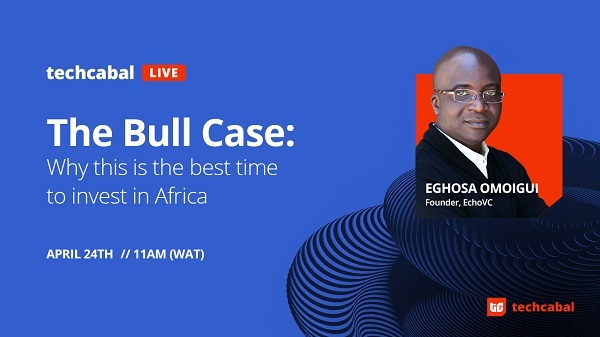A pandemic-induced economic downturn portends troubling times for businesses, but Africa remains the best destination for smart capital. The secret, according to Eghosa Omoigui, founder and managing partner of EchoVC, is in the continent’s antifragility.
Omoigui shared his thoughts on the bullish case for investing in Africa as a guest on TechCabal Live, a live video series of conversations with founders, investors and ecosystem builders about our post-COVID-19 future.
EchoVC’s portfolio companies include LifeBank, Hotels.ng, Riby and Migo, among others. Omoigui, a long-time investor in Silicon Valley and Africa, believes there is no better time than now to invest in Africa.
“Antifragility is the case for why Africa is more interesting than anywhere else,” Omoigui says.
Popularised by the psychologist Nassim Taleb, antifragility is the quality of an organisation or group to “thrive and grow when exposed to volatility, randomness, disorder, and stressors and love adventure, risk, and uncertainty.”
Even in the middle of a historic global recession, capital will always look for a vacuum, Omoigui says. Investors are faced with the twin dilemma of risk and uncertainty. While risk is fairly easier to model, the coronavirus pandemic has fuelled the latter around the world.
Omoigui’s thesis is that while reasonable anxiety exists over the return of many small businesses in the US after the crisis. African businesses have adapted a resilience to disorder and uncertainty over time, making them suitable opportunities for investors.
“My view is that capital should chase antifragility and it exists in spades in Africa,” Omoigui says.
[Read: Sim Shagaya on building African businesses in tough times]
It won’t be plain sailing, however. Africa has many stumbling blocks stifling return on capital, from infrastructure deficits and regulation, to human development factors like education and healthcare. These, Omoigui says, will have to be removed to reduce the friction that stands in the way of productivity and growth.
“The demand for digital services and well-priced, well-distributed, trusted digital services has never been higher. It’s every sector – health, education, eCommerce, media, agriculture.”
Each of these sectors has the potential for large consumer adoption even without being digital. In each sector, mission-driven founders who identify businesses waiting to be built will find investors that can provide the support they need.
Entrepreneurs will have to “think deeply about the product and the market,” refusing the urge to judge a market by popular perception. A high-resolution understanding of their markets, Omoigui says, will be a key differentiating factor.
But just as important is a founder’s ability and willingness to eat bitterness, a Chinese maxim for an ability to endure unpleasant occurences with good humor, usually for an ultimately gratifying outcome.
In this period, investors and founders are locked in survival conversations. From the need to provide emergency cash to run through the period, to hedging assets in safer currency denominations, the standard for prioritizing one portfolio company over another – for a large VC or investor – is unclear.
But instead of hoping for a set of objective metrics for carrying out this triage, Omoigui says investors would have to adopt a “somewhat Darwinian lens on the state of your portfolio.”
For each portfolio company, the founder would have to sufficiently make the case for why his/her is entitled to survive.
That said, the challenge and potential reward is in maintaining an active presence in the market.
“Don’t quit, don’t stop investing. Set higher standards for what you’re expecting from the entrepreneurs and how they are going to need to use the money you are investing in them. But don’t stop investing.”




















